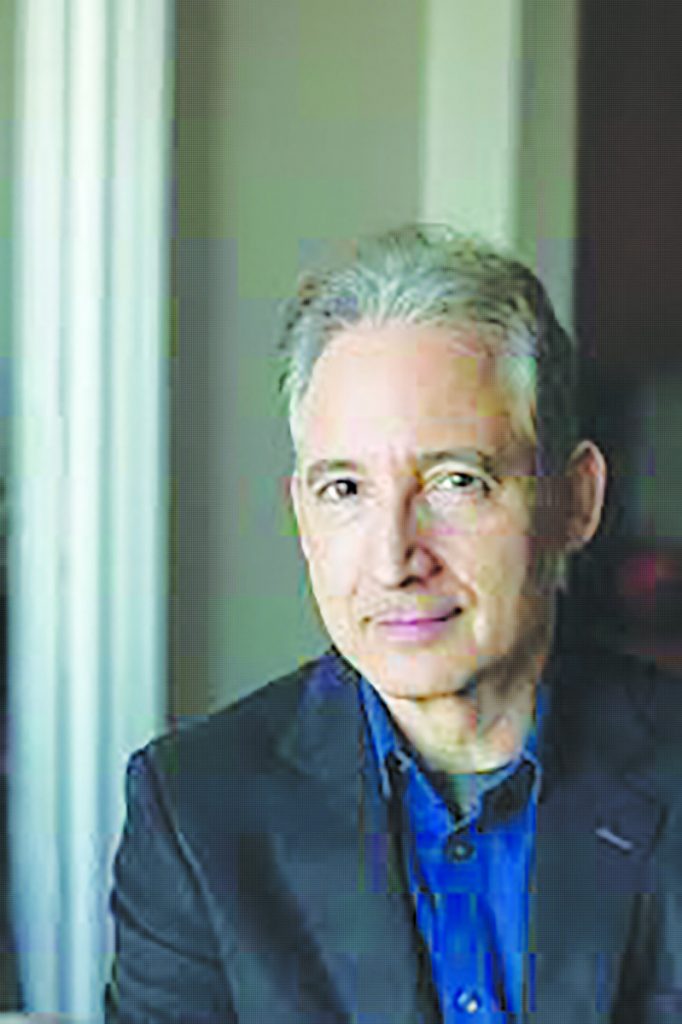Arden Ryan
Contributing Writer

Brian Greene was in high school when he realized he had a knack for explaining big ideas.
He was once tasked with lecturing his class on the science of sleep, so he dove into the research to create an engaging presentation that would excite his classmates. The class responded well, and at that moment he realized that breaking down complex concepts may be part of his future.
Greene was right. In his career as a theoretical physicist and professor of physics and mathematics at Columbia University, he has developed a reputation as a preeminent science communicator of the day.
A leading proponent and researcher of string theory — conceptually explaining that infinitesimal strings constitute the universe at its most fundamental level — Greene makes it his daily work to break complicated theories into absorbable thoughts.
“The reverie, the wonder and the respect for life and mind that the cosmological perspective seeds, for me, is the most valuable lesson.”
BRIAN GREENE
String theorist, author,
Until the End of Tme: Mind, Matter, and Our Search for Meaning in an Evolving Universe
At 10:45 a.m. today in Amphitheater, Greene will continue the week’s Chautauqua Lecture Series theme, “The State of Believing,” with an exploration into humanity’s beliefs about science and the universe, bringing big ideas for Chautauquans to ponder.
Greene will share features from a life spent contemplating the cosmos, how humans understand it, and how humans have developed different — but not incompatible — beliefs about the world and its origins.
“As human beings, our sense of where we came from and what matters to us has an impact on everything that we do,” Greene said.
As he will share this morning, humans gravitate toward two innate belief systems: one of scientific facts and one of expressive origin stories. Humans have “a fundamental need to anchor” their perception of the universe and ideas about it “through an understanding of origins.”
Both the factual and the spiritual are valuable pathways to understanding the universe, Greene said, but the pair should not be confused.
“It’s in the place of interface between these two that we find both richness, but also challenges,” he said.
He thinks that knowing your past can inform and give purpose to your present.
“We as a species have tried to understand where we collectively come from, where the planet comes from, where the stars come from – ultimately, where the universe comes from,” Greene said.
When early humans began to ask those questions, there was no science, no “logically reasoned, coherent set of insights” to provide answers. They then “filled that gap with wonderfully rich and potent stories of creation” to make sense of the world. With scientific advances, more useful stories answered queries about the future, Greene said, but that doesn’t mean the old stories should be discounted.
While these stories can’t make useful predictions, they are no less significant to humanity, Greene said, and there is value in recognizing the questions that each system is able to answer.
“(They) brush up against each other because they’re both talking about origins in the largest sense of the term,” he said. “There is a place for the stories that emerge, so long as you keep straight what those stories are particularly adept at providing insight into.”
The friction between frames of mind can be “destabilizing” when a “false competition arises,” Greene said. “If you have an open enough mind to hold these kinds of ideas simultaneously … then they can coexist in a harmonious way.” That is not an easy task, Greene said — people are not accustomed to accepting both at once, as distinct and equally important.
Theories about the universe can be taken as controversial by either side, if one doesn’t see from the other’s perspective. Greene said he believes the problem is less a failure of public education about science than it is a social bifurcation between groups with contrasting perspectives.
People hold close group associations, he said, be it with a religious or scientific community. Individual members often want the views of their group to triumph over their competitors, not taking the others’ into consideration, “gravitating toward (their group’s) perspective with a tremendous force.”
To find common ground, people need to feel heard and understood, Greene said, and given a fair chance to express their beliefs. He perceives a “deep sense of being dissatisfied and feeling of being ignored,” among many, which can drive people away from those who disagree with them and toward a group that can empathize instead.
The pull of people farther to one side “has nothing to do with lack of understanding of science or understanding of science,” Greene said. “It’s one’s feeling of how the world is treating them.”
Our current moment in the universe is unlike any other time that came before or will come after it, Greene said in a 2012 TED Talk. Now is the time to observe and learn everything we can from the universe.
“We are living through a remarkably privileged era when certain deep truths about the cosmos are still within reach of the human spirit of exploration. It appears that it may not always be that way,” Greene said in the talk.
That being said, more than 10 years later Greene does recognize that “everything that we value, all life in the cosmos … is just a snap of the finger” and will be gone in a relative instant. The human timescale for change is vastly different than for the universe. The things that seem so dire on a human scale are but trivialities in the history of everything, he said, which for him was a life-changing revelation.
Many people will be shocked and react differently to that insight, Greene said. Although the same cannot be said for everyone, in Greene’s personal view, the search for meaning and purpose in life should come from an inward search, and not from far out in space.
He said he’s inspired by the “wonder that life, that consciousness, can exist,” even if it is for a brief time on cosmological scales.”
“The reverie, the wonder and the respect for life and mind that the cosmological perspective seeds, for me, is the most valuable lesson,” he said.
Greene is most excited when immersing himself in the deep concepts of his area of study, engaging with “the words and conclusions (of) some of the great thinkers of the ages.” For him, being a part of the “ongoing human quest to make sense of existence is … so thrilling that it makes it all worthwhile.”




